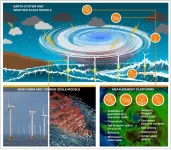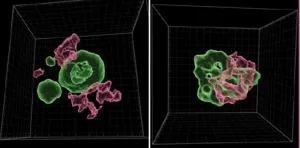(Press-News.org) Researchers have shown that larger insects such as woodlice and beetles play as much of a crucial role in leaf litter decomposition across different habitats and seasons as microbes and smaller invertebrates.
The research, published today as a final Version of Record after previously appearing as a Reviewed Preprint in eLife, was described by editors as a fundamental study that substantially advances our understanding of the role of different-sized soil invertebrates in shaping the rates of leaf litter decomposition. The authors provide compelling evidence that the summed effects of all decomposers on decomposition rates, with large-sized invertebrates being more active in summer and microorganisms in winter, result in similar levels of leaf litter decomposition across sites of different aridity levels. The research will be of interest to ecologists modelling carbon cycles to understand global warming.
Leaf litter decomposition is a key process that determines the cycling of elements such as carbon in land ecosystems. The rate of decomposition is influenced by climate, the quality of leaf litter and the identity and abundance of different decomposer organisms.
“Evidence suggests that decomposition is faster under warm and wet conditions, and this has led to an assumption that microorganisms dominate in the decomposition process, largely ignoring growing recognition that animals may also play an important role,” says co-lead author Viraj Torsekar, at the time a postdoctoral scholar at The Alexander Silberman Institute of Life Sciences, The Hebrew University of Jerusalem, Israel, and now an Assistant Professor at GITAM University, Visakhapatnam, India. “We speculated that the higher tolerance of macrofauna such as termites and beetles to arid climates may counterbalance the effect of smaller decomposers, leading to similar decomposition rates overall across different climatic extremes.”
To investigate this, the team placed plant litter baskets of three different mesh sizes in seven sites across Israel, ranging from hyper-arid habitats with scarce rainfall (mean annual rainfall of 22mm) to sites with cooler, wetter Mediterranean climates (mean annual rainfall of 526mm). The three basket types were ‘micro’ (large enough for microorganisms only), ‘meso’ (microorganisms and invertebrates smaller than 2mm, such as springtails) and ‘macro’ (large enough to include larger invertebrates between 2mm and 2cm in size, such as termites, woodlice and beetles). The baskets were installed for periods in both hot and dry summer, and cold and wetter winter seasons, with pitfall traps used to study the composition and abundances of the macrofauna assemblages.
The team found that the litter removal rate differed across seasons, sites and mesh sizes. Overall, microbial decomposition was minimal over the summer season and, in winter, was higher in wetter conditions. By contrast, meso-faunal decomposition was moderate in both seasons, and highest in semi-arid sites. Decomposition by macro-fauna (termites, woodlice and beetles) contributed minimally to decomposition in winter but dominated decomposition in the summer months. Species richness and abundance data from pitfall traps revealed that macro-faunal assemblages were most abundant and species-rich in arid sites, where macro-faunal decomposition was the highest. The authors explain that larger invertebrates are better able to cope with hot and dry conditions by moving into moist and cooler areas when needed.
The puzzle of why plant litter decomposition in arid land is faster than expected has perplexed scientists for half a century and has been called ‘the desert decomposition conundrum’. Previous attempts to resolve this have proposed that plant litter degradation in the desert might be facilitated by light, heat, fog, dew or humidity. But the findings of this study support a long-suggested but largely overlooked hypothesis – that it is macro-fauna decomposers that dominate plant litter decomposition in deserts.
“Our findings show that the opposing climate dependencies of micro- and macro-fauna decomposers have led to similar or even higher annual decomposition rates in arid sites compared to those measured in wetter climates,” says senior author Dror Hawlena, Professor at The Alexander Silberman Institute of Life Sciences, The Hebrew University of Jerusalem.
“This suggests that it is the different climate dependencies of different-sized decomposers rather than abiotic factors that explain the discrepancy between classic decomposition models and the observed decomposition rates in drylands, providing a plausible solution to the dryland decomposition conundrum,” concludes co-lead author Nevo Sagi, at the time a PhD student at The Hebrew University of Jerusalem, and now a postdoctoral scholar at the University of Texas at Austin, US. “Understanding the mechanisms that regulate decomposition in drylands is key for conserving and restoring fundamental ecosystem processes in these ever-expanding areas, and in improving our understanding of global processes such as carbon cycling.”
##
Media contacts
Emily Packer, Media Relations Manager
eLife
e.packer@elifesciences.org
+44 (0)1223 855373
George Litchfield, Marketing and PR Assistant
eLife
g.litchfield@elifesciences.org
About eLife
eLife transforms research communication to create a future where a diverse, global community of scientists and researchers produces open and trusted results for the benefit of all. Independent, not-for-profit and supported by funders, we improve the way science is practised and shared. In support of our goal, we have launched a new publishing model that ends the accept/reject decision after peer review. Instead, papers invited for review will be published as a Reviewed Preprint that contains public peer reviews and an eLife assessment. We also continue to publish research that was accepted after peer review as part of our traditional process. eLife receives financial support and strategic guidance from the Howard Hughes Medical Institute, Knut and Alice Wallenberg Foundation, the Max Planck Society and Wellcome. Learn more at https://elifesciences.org/about.
To read the latest Ecology research published in eLife, visit https://elifesciences.org/subjects/ecology.
END
Arthropods dominate plant litter decomposition in drylands
An analysis of leaf litter breakdown in climatically diverse habitats shows that decomposition by larger invertebrates dominates in hot, dry regions and warmer seasons.
2024-10-15
ELSE PRESS RELEASES FROM THIS DATE:
World-renowned organic chemists attend inaugural science symposium hosted by Rice’s Global Paris Center
2024-10-15
The inaugural Art and Science of Total Synthesis of Natural and Designed Molecules for Biology and Medicine (ASTS-NDM 2024) symposium brought together some of the world’s most renowned organic chemists Oct. 2-4 at the historic Club de la Chasse et de la Nature in Paris. Hosted by Rice University’s Global Paris Center , the event explored the evolving role of synthetic organic chemistry and total synthesis of natural and designed molecules in fields such as medicine, materials science and chemical biology.
The three-day symposium attracted leading figures in synthetic organic chemistry, featuring 18 speakers who presented ...
The trees of Miami’s future
2024-10-15
In Miami—a place known for one of the most diverse tree canopies in the world—nearly half of the native trees may struggle to survive in the coming decades, a new University of Miami study indicates.
Due to global warming, temperatures may simply become too hot for some of the types of trees that dominate the city’s current landscape, like live oaks, slash pines, and cabbage palms.
But the research also found that strategically planting more tropical trees may help the local canopy stay resilient in the face of climate change.
Through an extensive data analysis project, a team of ecologists in the Department of Biology in the College of Arts and Sciences discovered ...
MIT team takes a major step toward fully 3D-printed active electronics
2024-10-15
CAMBRIDGE, MA – Active electronics — components that can control electrical signals — usually contain semiconductor devices that receive, store, and process information. These components, which must be made in a clean room, require advanced fabrication technology that is not widely available outside a few specialized manufacturing centers.
During the Covid-19 pandemic, the lack of widespread semiconductor fabrication facilities was one cause of a worldwide electronics shortage, which drove up costs for consumers and had implications in everything from economic growth to national defense. The ability to 3D print an entire, active electronic ...
Accelerated three-year medical school students perform as well as peers in traditional four-year programs
2024-10-15
Graduates who went to medical school for three years performed equally well on tests of skill and knowledge as their peers who followed a four-year program, a new study shows.
The accelerated three-year MD pathway offered by NYU Grossman School of Medicine beginning in 2013 was designed to help students earn their medical degrees sooner with reduced debt, which some experts say reaches $250,000 on average by graduation. The school was the first in the United States to offer a three-year MD program that ...
SwRI-developed instruments will study potential habitability of Jupiter’s moon Europa
2024-10-15
SAN ANTONIO — October 15, 2024 —Two Southwest Research Institute instruments were launched aboard NASA’s Europa Clipper spacecraft on Oct. 14 from the agency’s Kennedy Space Center. The spacecraft is designed to conduct a detailed reconnaissance of Jupiter’s moon Europa, investigating whether it could hold conditions suitable for life.
The SwRI-developed MAss Spectrometer for Planetary EXploration (MASPEX) and Ultraviolet Spectrograph (Europa-UVS) are among nine science instruments and a gravity science investigation that were developed to explore Europa, Jupiter’s fourth-largest ...
Proposed scoring system may enhance equity in organ transplantation, increase transplant rates and improve patient survival
2024-10-15
Tuesday, Oct. 15, 2024, Cleveland: Researchers at Cleveland Clinic and Case Western Reserve University (CWRU) have developed a new method that could potentially help provide better access to lung transplant for transplant candidates who are hard to match because of their blood type or height.
An analysis published in the Journal of Heart & Lung Transplantation showed significant inequity in lung transplant access based on these candidate characteristics and proposes a method for addressing it.
Lung transplant candidates require organs from donors of similar height and compatible blood type. Currently, to allow equally sick candidates equal ...
Survivors of childhood brain cancer are more likely to be held back in school
2024-10-15
In 2019, Raymond Mailhot was visiting with a young patient and his family facing a scary diagnosis – brain cancer. Treatments were incredibly effective, and the young boy was going to survive, Mailhot shared in Spanish with the Venezuelan immigrants.
But life would be disrupted at home, at the hospital, and at school, likely for months, he said.
“His story really made me want to dig deeper into the scholastic performance of survivors,” said Mailhot, M.D., M.P.H, an associate professor of radiation oncology at the University of Florida. “We discovered that survivors had twice the odds of being held back and performed significantly worse on state testing ...
Updating offshore turbine designs to reflect storms’ complexity is key
2024-10-15
WASHINGTON, Oct. 15, 2024 – The U.S. is ramping up plans for a major increase in offshore wind production, with 30 gigawatts of new installations expected by 2030 and a total of 110 gigawatts by 2050. But to be successful, the country needs to design turbines that can withstand the challenges of tropical storms.
“Extreme weather impacts on offshore wind turbines are not fully understood by the industry,” author Jiali Wang said. “Manufacturers design wind turbines based on international design standards, but better models and data are needed to study the impacts of extreme weather ...
Hospital strain during the COVID-19 pandemic and outcomes in older racial and ethnic minority adults
2024-10-15
About The Study: In this cross-sectional study, older adults hospitalized with sepsis were more likely to die or experience major morbidity as the hospital COVID-19 burden increased. These increases in adverse outcomes were greater in magnitude among members of minority populations than for white individuals.
Corresponding Author: To contact the corresponding author, Laurent G. Glance, MD, email laurent_glance@urmc.rochester.edu.
To access the embargoed study: Visit our For The Media website at this link https://media.jamanetwork.com/
(doi:10.1001/jamanetworkopen.2024.38563)
Editor’s Note: Please see the article for additional information, ...
Scientists unveils key role of “selfish DNA” in early human development
2024-10-15
A critical transition in early human development is regulated not by our own genes, but by DNA elements called transposons that can move around the genome, Sinai Health researchers have found.
This remarkable discovery challenges our previous understanding of these elusive DNA segments, shedding new light on the roles they play in human development and disease.
“People tend to think of transposons as akin to viruses where they hijack our cells for the sole purpose of propagating themselves,” says study’s senior co-author Dr. Miguel Ramalho-Santos, Senior Investigator at the Lunenfeld-Tanenbaum Research Institute (LTRI), part of Sinai Health, and Professor ...
LAST 30 PRESS RELEASES:
Brain cells drive endurance gains after exercise
Same-day hospital discharge is safe in selected patients after TAVI
Why do people living at high altitudes have better glucose control? The answer was in plain sight
Red blood cells soak up sugar at high altitude, protecting against diabetes
A new electrolyte points to stronger, safer batteries
Environment: Atmospheric pollution directly linked to rocket re-entry
Targeted radiation therapy improves quality of life outcomes for patients with multiple brain metastases
Cardiovascular events in women with prior cervical high-grade squamous intraepithelial lesion
Transplantation and employment earnings in kidney transplant recipients
Brain organoids can be trained to solve a goal-directed task
Treatment can protect extremely premature babies from lung disease
Roberto Morandotti wins prestigious Max Born Award for pioneering research in quantum photonics
Scientists map brain's blood pressure control center
Acute coronary events registry provides insights into sex-specific differences
Bar-Ilan University and NVIDIA researchers improve AI’s ability to understand spatial instructions
New single-cell transcriptomic clock reveals intrinsic and systemic T cell aging in COVID-19 and HIV
Smaller fish and changing food webs – even where species numbers stay the same
Missed opportunity to protect pregnant women and newborns: Study shows low vaccination rates among expectant mothers in Norway against COVID-19 and influenza
Emotional memory region of aged brain is sensitive to processed foods
Neighborhood factors may lead to increased COPD-related emergency department visits, hospitalizations
Food insecurity impacts employees’ productivity
Prenatal infection increases risk of heavy drinking later in life
‘The munchies’ are real and could benefit those with no appetite
FAU researchers discover novel bacteria in Florida’s stranded pygmy sperm whales
DEGU debuts with better AI predictions and explanations
‘Giant superatoms’ unlock a new toolbox for quantum computers
Jeonbuk National University researchers explore metal oxide electrodes as a new frontier in electrochemical microplastic detection
Cannabis: What is the profile of adults at low risk of dependence?
Medical and materials innovations of two women engineers recognized by Sony and Nature
Blood test “clocks” predict when Alzheimer’s symptoms will start
[Press-News.org] Arthropods dominate plant litter decomposition in drylandsAn analysis of leaf litter breakdown in climatically diverse habitats shows that decomposition by larger invertebrates dominates in hot, dry regions and warmer seasons.






